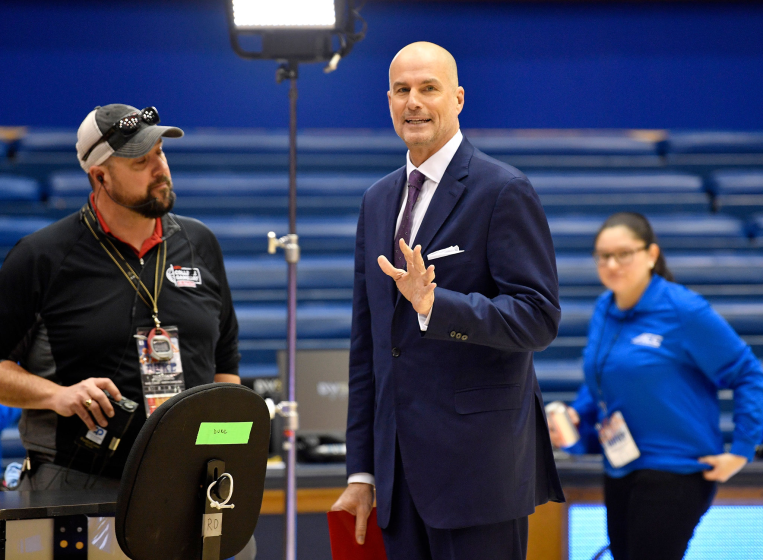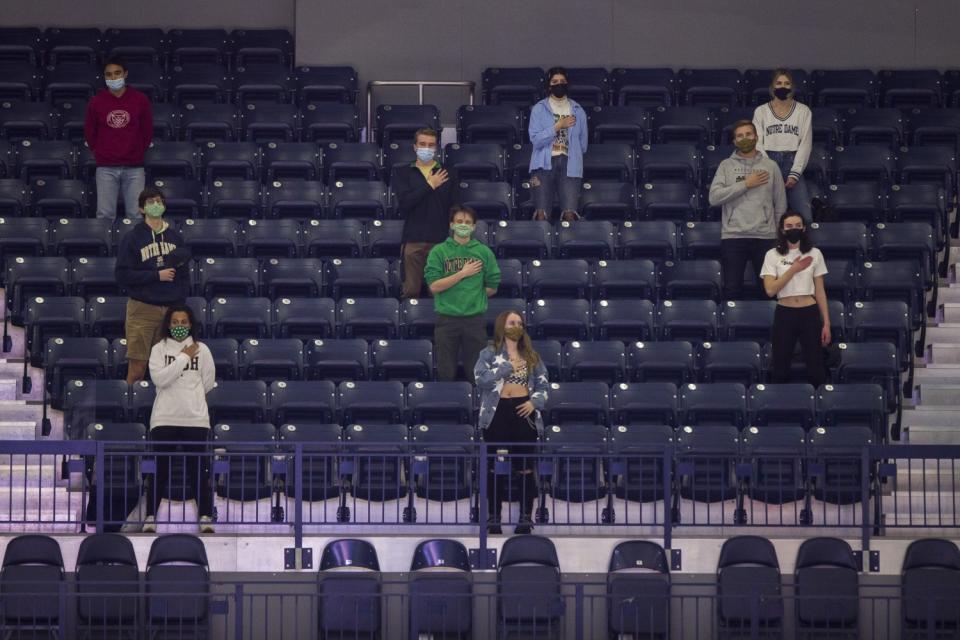'These players are pros': A pre-March Madness Q&A with ESPN's Jay Bilas

Somehow, college basketball’s regular season is already coming to a close. For the sport’s diehards, who may not have gotten to see their favorite team play in person but were still glued to every game that wasn’t wiped out by COVID-19 protocols, it probably feels like it was gone in a flash. For the players, who spent the winter isolated and hoping for games to stay scheduled, it probably felt like it would never end.
A March unlike any other has begun, and with that the thrill of Madness and 68 teams converging on Indianapolis for the NCAA men's tournament, which hasn’t crowned a new champion in two years.
But before our collective imagination gets swept up in the postseason, the pandemic regular season — particularly the way it was experienced for all those involved — deserves further reflection. And who better to offer it than ESPN’s Jay Bilas, the voice and conscience of the sport today and, surely, for years into the future?
Nobody in college basketball has more ably walked the tightrope of buoying the game with his passion, quick wit and analytical eye while also serving as the consistent NCAA critic with the biggest platform for commentary.
We caught up with Bilas this week and discussed the oddities of hallowed barns with no fans, the sacrifices of the players and the hypocrisy displayed by the NCAA and its member schools to get this season played and onto television screens. Here’s the conversation in question-and-answer format:
What has it been like calling games in empty arenas?
It’s been bizarre. It’s like going to a scrimmage, and I have been to a lot of those. It’s just the teams, you can hear the sneakers squeak, the coaches talking, and you can hear the players talking to one another and barking out commands, yet the lights are on, and it’s a performance. I was talking to somebody recently who asked, “What would you compare it to?” It’s like if you went to an [empty] comedy club, and the jokes are the same, they’re still really funny, but it doesn’t have the same communal feeling as if you’re in a big crowd and you’re cracking up together. Then, it just seems funnier and more enjoyable. So we’re missing the atmosphere of the crowd, and it’s not just basketball. It was the same in football, but in football the crowd’s a little more removed and they don’t show it as often on TV.”
Having played at Duke and spent so much time at Cameron Indoor Stadium, it had to be even more surreal being there this year.
Duke’s way different. I’m kind of used to it now. The odd part is, you are out of the arena and into your car and on the road in five minutes as soon as the game is over. You don’t have to worry about crowds. The job isn’t as enjoyable because you don’t have the interactions with people you would normally see. I normally spend the day going to practices, and all those interactions are over because of COVID restrictions. Instead, you’ve got all these damn Zoom meetings, which are the worst invention in the history of mankind. It’s better than nothing, but it certainly doesn’t take a genius to say it’s not the same.
Has college basketball been able to capture any national attention during the regular season?
Oh, it’s diminished. But that was true of college football, the NFL, everything’s been diminished. I think the idea that this country needed sports to deal with COVID was a pipe dream and not true. I don’t know what we needed, whether we need Netflix or alcohol or whatever. I don’t mean to make light of it, but clearly people are not as into it because they’re not in their normal routines. It’s my job, and I have to remind myself when there’s certain things on. The games are at different times because you’ve had so many postponements. Last night, I had a game [Michigan-Illinois on Tuesday] and I had forgotten that Baylor and West Virginia played right before because it was a 5 o’clock game on a Tuesday. That doesn’t normally happen.
Do you think the college basketball product appeal suffers more from having no fans than other sports?
I think that’s true of every sport. It was totally different watching games in the bubble for the NBA than it was watching in a normal year where the crowd is going nuts. Atmosphere is important and the communal part of this is important. You’re not getting together with people to watch games anymore. Heck, I can’t remember the last time we were out to dinner with friends. We’ll get out of it, but I go back to whether you’re going to a Broadway musical or a comedy club or a movie, it’s different watching a movie when there’s a big crowd there. So the communal aspect of sport has been badly affected by this. I can’t imagine it’s as fun to play for the players, or as much fun to coach.

You mentioned the players. How do you think the way the NCAA has handled the pandemic will affect the schools in future litigation related to amateurism?
They’re going to say the same things they’ve always said. It’s almost shameless in that regard. At the beginning of the pandemic, they said, now let’s be clear here, no students on campus, no college sports. Well that changed pretty quick. Then they said, we won’t play in bubbles, we are not the NBA, we are college sports, we are different. And what are they doing? They have players in complete isolation, and they’re playing in bubbles, and they’re playing the NCAA tournament in a bubble environment. They can say it’s not, but they trademarked the term “Battle in the Bubble.” The players have been treated as essential workers. When the government was telling people at the height of the pandemic in December and January not to travel unless it’s essential, who was traveling? College football and basketball players were traveling, and they were getting tested every day and still are. Health care workers on their campuses weren’t getting tested like this.
It’s pretty clear this has operated like pro sports. And while the players have agreed, what choice do they have? It’s being mandated to them. It’s an either/or choice for them. The players know what to say and they’ve said it, but there’s no question that all this has been done to generate revenue. I think you heard like everyone else that “the players are safer playing than they would be otherwise.” I thought that was a convenient rationalization that the revenue generators are safer generating revenue than if we let them go home and be with the other students.
There’s nothing wrong with generating revenue, but it should be admitted, these players are pros. The funny part is, the paid coaches and staff, they all go home at night. They’re not in isolation. Only the players are.
There was discussion about, well maybe we shouldn’t play in our conference tournament. Then it was, well, wait a minute, this could cost us. When the league office said, “Well, we need inventory for our media partners,” all that talk went away. They’re playing. They have to play for the inventory.
So, you’re an attorney. Has the NCAA made the players’ attorneys jobs easier to win present and future cases?
It’s just further evidence of what college sports is. It’s a multibillion-dollar professional sports and entertainment industry. That’s OK. The pandemic has made it pretty clear, if it wasn’t clear already. Even the most sort of strident apologist of the NCAA can’t deny what they’re seeing now. It’s laid bare. We had to play, so we’re going to, and nothing is going to stop it, and nothing did stop it. I don’t have a problem with that, but we couldn’t even have a discussion about not can we play but should we play? Given the rhetoric of the NCAA, is this the right thing to do, based on the values that they’ve stated? And it’s funny, I haven’t seen the NCAA president in a long time. He hasn’t made a public statement in forever. You kind of wonder why that is.
Seems like the pandemic would have been a perfect time for the NCAA to help itself in court if its schools had just treated the athletes like regular students. But there was too much short-term money on the line.
I think they would say, look at all the hoops we’ve gone through to keep them safe. To me, they’re not jumping through these same hoops for other students to pursue their chosen field. We haven’t seen this type of action to have students in class or to have the school play or the school orchestra or anything like that. We’ve only seen it for sports. These schools are content providers for media rights deals, and their conferences are media rights consortiums. The NCAA likes to say, we’re not the NFL, we’re not the NBA … you’re right, you’re not, but your members are. The SEC is like its own little NFL and so is the ACC, the Big Ten, they each have their own media rights deals, and they have their own leagues and championships, and then the NCAA just runs a tournament. That’s what it is.
This story originally appeared in Los Angeles Times.

